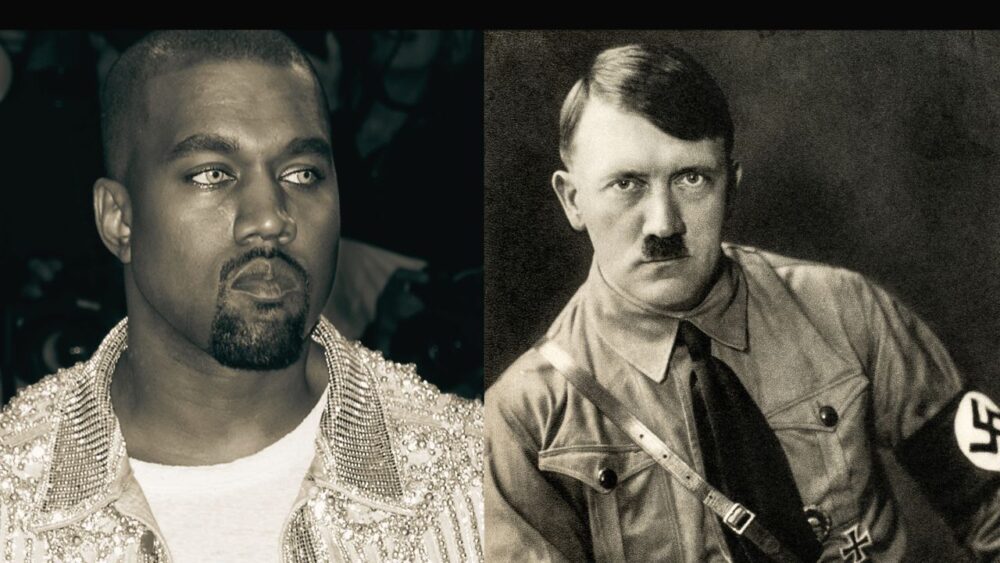Spotify has removed rapper Kanye West’s new song “Heil Hitler,” while Adolf Hitler’s speeches remain accessible on the streaming service. West, who now goes by Ye, included “Heil Hitler” on his recent album, Cuck.
The Dallas Express observed that the platform had also frozen several user attempts to re-upload the track. The New York Post reported that Spotify has actively policed repostings of the track. Meanwhile, other songs from the same album—such as “Cousins” and “WW3″—remain live on the site.
The track’s chorus repeats “Ni**a, Heil Hitler,” while the lyrics touch on West’s estrangement from his children. “With all the money and fame, I still can’t get my kids back,” West raps. West has four children with his ex-wife and reality star Kim Kardashian.
Another lyric states, “Ni**as see my Twitter but they don’t see how I be feeling; so I became a Nazi, yeah, bitch I’m the villain.”
An audio recording of Adolf Hitler closes the track. Translated from the original German, the clip reportedly includes a call for political support: “If you consider the work I’m doing to be right… then stand up for me like I have stood up for you!”
Spotify’s removal of “Heil Hitler” marks a notable contrast with its previous posture during the 2021–22 controversy surrounding The Joe Rogan Experience. Criticism from free speech advocates point out inconsistent moderation standards.
Amid calls to deplatform Rogan over his interviews with COVID-19 policy critics such as Dr. Robert Malone and Dr. Peter McCullough, Spotify defended its support for creator expression.
At the time, the company stated, “We know we have a critical role to play in supporting creator expression while balancing it with the safety of our users… it is important to me that we don’t take on the position of being content censor.”
When a viral supercut of Rogan saying the “ni**a” surfaced shortly afterward, Spotify CEO Daniel Ek acknowledged the footage was “incredibly hurtful” but said he did not believe “silencing” Rogan was the answer, according to a memo reported by CNN.
Free speech advocates say this latest decision surrounding “Heil Hitler” raises questions about consistency.
“Still, platforms that claim to value free expression should mean it and strive to moderate content in a fair, transparent, and consistent way,” said Aaron Terr, director of Public Advocacy at the Foundation for Individual Rights and Expression (FIRE). “That’s hard to do when a platform has vague and subjective rules, like Spotify’s ban on content that ‘incites violence or hatred’ toward certain groups.”
Terr added that “drawing lines is especially difficult when it comes to music and other art forms, which often thrive on provocation or grapple with dark subject matter.”
Spotify’s content guidelines prohibit hate speech, but those standards are unevenly applied. For instance, full-length recordings of Adolf Hitler’s speeches remain accessible on the platform—meaning users can stream Hitler before they can stream “Heil Hitler.”
The Dallas Express asked Terr about this, to which he responded, “Your example of historical recordings of Hitler’s speeches drives the point home… These policies give a lot of wiggle room to take down content that some consider offensive or harmful.”
This incident has reignited the debate over the role of censorship in music. SoundCloud has also removed “Heil Hitler,” and the online music lyric library Genius has removed its archive of the song’s lyrics.
West’s “Heil Hitler” continues themes introduced in other recent tracks.
In “WW3,” he raps about becoming a villain despite not appearing on Jeffrey Epstein’s client list. Epstein, a convicted sex offender and financier, allegedly trafficked and abused underage girls on his private island in the U.S. Virgin Islands. Many influential Americans were known to have visited the island.
In another song, “Cousins,” West makes a personal confession about performing oral sex on a male cousin during childhood.
“This episode is reminiscent of when Country Music Television pulled Jason Aldean’s music video for ‘Try That in a Small Town’ after critics said it promoted violence, vigilantism, and racism,” Terr explained. “As FIRE noted at the time, efforts to suppress expression often backfire by bringing more attention to it. That seems to be what’s happening with Ye’s new track.”
The heavy censorship response from major streaming services has drawn comparisons to another moment in music history.
In 1990, Madonna’s “Justify My Love” music video was banned from daytime television airplay for its depiction of a shadowy, sexually charged European hotel. The imagery was an obvious nod to Charlotte Rampling’s character in “The Night Porter,” a film exploring themes of trauma, sexuality, and Nazism. The music video included a topless Rampling-esque woman in Nazi-like attire.
MTV refused to air the video, and in many cases, fans could only watch it by purchasing a VHS tape from certain stores — a now-infamous episode in the battle over free expression in pop culture.
While Spotify, a private company, is not bound by the First Amendment, its choices in moderating content send broader signals to creators and consumers alike.
“Spotify might be better off letting its users decide what to listen to,” Terr said, “rather than positioning itself as the arbiter of moral boundaries in art.”
Spotify was contacted in the production of this story but did not return a comment.


